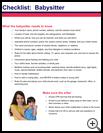
Child Care: Babysitter Guidelines
________________________________________________________________________
KEY POINTS
- If possible, talk with and get to know a new babysitter before letting him or her care for your child. It’s also a good idea for your child to spend time with the sitter ahead of time.
- Make sure that the babysitter knows how to contact you, the police, poison control center, hospital, and your child's healthcare provider. Give clear instructions about keeping your child safe, as well as rules about your child’s routines and behavior. Let the sitter know that it is OK to call you with any questions or concerns.
________________________________________________________________________
Hire a sitter who already knows your child if possible. You may be able to trade babysitting duties with friends who also have children. Never use a sitter less than 12 years of age. When hiring a sitter, focus on your child’s safety and welfare.
If you cannot hire someone you know, get recommendations from family and friends. If you need to hire a new sitter, be sure to check references. Get to know the person before letting him or her care for your child. Arrange for the sitter to meet your child before babysitting if possible.
It helps to share information with babysitters, both when you first talk to them and when you leave the house. This gives the babysitter a better idea of what you expect. Allow enough time to go over your list and show the sitter around your house. Point out where to find things they may need and talk about the fire escape plan and emergency exits.
Be sure to write down important information so the sitter can refer to it after you leave.
Here is some information the babysitter should have while you are away:
- Your family’s name, phone number, address, and the nearest cross street
- Location of exits, first aid supplies, fire extinguishers, and flashlights
- Where you will be, how you can be reached, and when you will return
- Important phone numbers for the police, fire department, poison control center, hospital, and your child's healthcare provider that are posted in a place that is easy to find, such as on the refrigerator or near the phone
- The name and phone number of nearby friends, neighbors, or relatives
- Children's names, ages, weights, any food allergies or medical conditions, and information about medicines that your child needs to take, such as the name of the medicine, when it should be given, and how much to give
- Rules that apply to both the child and to the sitter such as rules about friends visiting, TV, game and computer use, how to answer the telephone, outdoor play, smoking, and snacks
- Warnings about not opening the door to strangers and keeping all outside doors locked
- Instructions about feeding and bathing your child
- Special instructions about such things as your child's fears, favorite play activities, or family pets
- Bedtime routines such as brushing teeth, washing hands, favorite bedtime story, night lights, music, special blankets, stuffed animals, and bedroom door open or closed
- How to handle misbehavior
- How to calm a crying baby and NEVER to shake a baby or child
- Rules for play and places your child should avoid such as the garage, basement, office, or swimming pool
Make sure the sitter:
- Knows CPR and has first aid training
- Knows to put babies to sleep lying on their back, not on their tummies or sides
- Never leaves your child unattended or alone in the house, especially while your child is in a high chair, walker, bath, or stroller
- Knows that it is OK to call you with any questions or concerns
If you do not have a land line in your home, make sure the sitter has a cell phone that is fully charged and has phone reception at your home. Review rules for using cell phones, tablets and computers such as not posting anything to social media concerning your children, family, or home, including photos.
If you plan to use an older sibling as a babysitter, make sure he or she is mature enough to handle the responsibility. Do not assume your teen knows what to do. It helps to have your teen take the American Red Cross babysitter class or other similar course.
Last modified: 2019-12-23
Last reviewed: 2019-09-16

